Lay Summaries
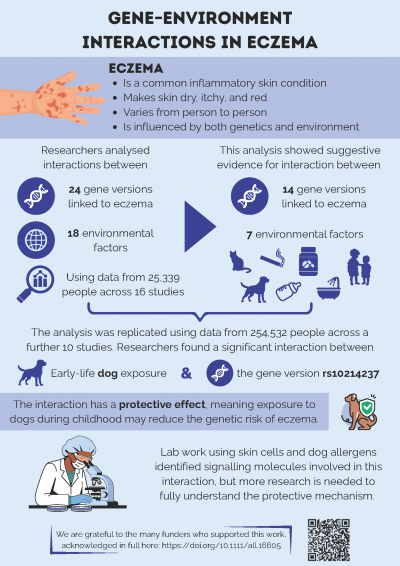
Gene–Environment Interaction Affects Risk of Eczema
Written by Prof Sara Brown and Dr Lauren Kelly
Having a pet dog in the family home could help protect a child from developing eczema, especially if they are genetically predisposed to this condition. Using population research to study 300,000 peo...
read more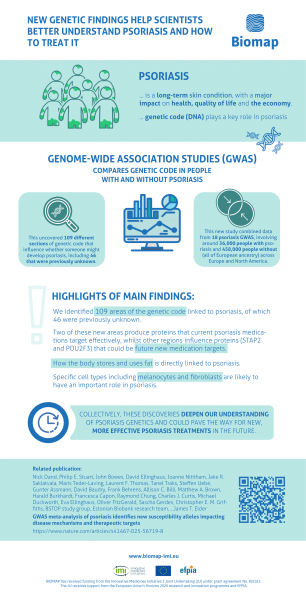
New genetic findings help scientists better understand psoriasis and how to treat it
by Manpreet Sagoo
Psoriasis is a long-term skin condition affecting 60 million people worldwide, with a major impact on health, quality of life and the economy. Our genetic code (DNA) plays a key role in psoriasis and researchers want to underst...
read more
Beyond Skin, Gut, and Brain: Understanding Disease Connections by Why and How Diseases Happen, Not Just Where
Traditionally, diseases are classified based on the organs or tissues they most noticeably affect. For example, we distinguish between "skin" and "gut" diseases. However, research has revealed similarities between diseases that seem to have nothing i...
read more
Evidence that genetic predictors of cardiovascular diseases also increase psoriasis risk
Our recent study explores the link between genetic predictors of cardiovascular diseases and their connection to psoriasis, a chronic skin condition. Cardiovascular diseases, such as coronary heart disease and stroke, are leading causes of death worl...
read more
Higher inflammatory skin protein levels and changes of the skin microbiome precede and characterize childhood atopic dermatitis
Atopic dermatitis (AD), also known as atopic eczema, is the most common inflammatory skin disease in children. However, we are currently unable to reliably predict if or when AD might occur during childhood. This study aimed to find changes of skin p...
read more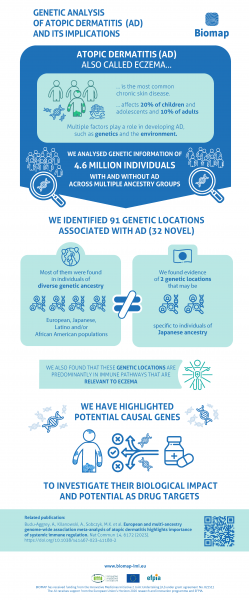
European and multi-ancestry genetic analysis of atopic dermatitis and its implications
Atopic dermatitis (AD; also called eczema) is a chronic skin disease that affects up to 20% of children and 10% of adults. Multiple factors play a role in developing AD, such as genetics and the environment. Several genetics studies have been perform...
read more
Psoriasis made easy: disentangling the complexity behind the skin lesions through the analysis of molecular networks
Psoriasis is a chronic inflammatory skin condition in which there is an increase in the rate at which skin cells are produced and shed from the skin, leading to the development of dry, itchy and scaly skin patches. Genetics and the immune system are...
read more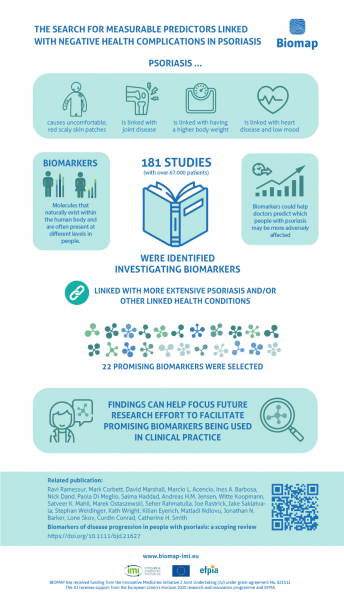
The search for measurable predictors linked with negative health complications in psoriasis
Psoriasis is a non-contagious, long-term, inflammatory skin condition that affects approximately two in every 100 people in the Western world. It causes uncomfortable, red scaly patches on the skin, and is also linked to associated conditions such as...
read more
The search for measurable predictors linked with safe and effective response to treatment in psoriasis
Psoriasis is a common, non-contagious, long-term, inflammatory skin condition affecting approximately two in every 100 people. People who have psoriasis suffer from uncomfortable, red scaly patches of skin which can have a significant negative impact...
read more
Biomarkers linked with the development of comorbidities in people with atopic dermatitis
Atopic dermatitis (AD) is the most common chronic skin disease. In high-income countries it affects up to 20% of children/adolescents and 10% of adults. About one-third of people with AD develop asthma, hay fever, and/or food allergies, but we do not...
read more
How does immunotherapy influence the skin microbiota of people living with atopic dermatitis?
The human skin is an ecosystem, populated by a large variety of bacterial species, called the skin microbiota. Within the skin microbiota, one can find a large diversity of species, many of which are beneficial to humans. In the scenario of skin affe...
read more
Systematic review of ethical and social aspects of biomarker research and its application in atopic dermatitis and psoriasis
Biomarker research is associated with high hopes for the two chronic skin diseases atopic dermatitis and psoriasis.
Although various effective treatments have been developed, many challenges remain concerning diagnostics (the practice of identif...
read more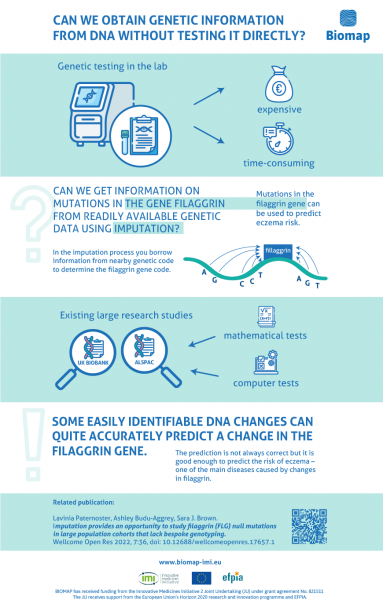
Can we obtain genetic information from DNA without testing it directly?
Our DNA or genetic code controls how our bodies work in health and disease. This is because our genes spell out the codes for proteins – the building blocks of life.
One gene, called filaggrin, holds the code for a protein that helps to make skin a...
read more
Differences in the comorbidities experienced between HLA-C*06:02 carrier groups in 9,000 psoriasis patients
Psoriasis is a very common skin condition with major impact on health and wellbeing. Unfortunately, some people also develop other health conditions (often termed ‘comorbidities’) such as arthritis and heart disease.
A person’s genetic make-up is a...
read more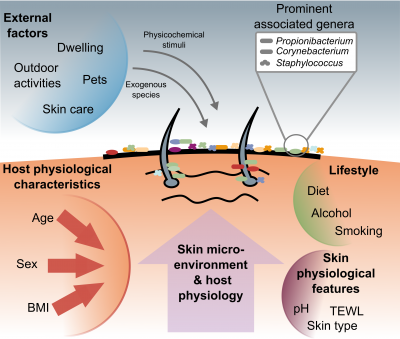
People’s physical features, their lifestyle and the environment are associated with the skin bacteria
Many bacteria, mostly harmless or beneficial, live on people’s skin. We know little about what influences these bacteria. Here, we studied the associations between people’s physical features, lifestyle and environment with the bacteria living on thei...
read more